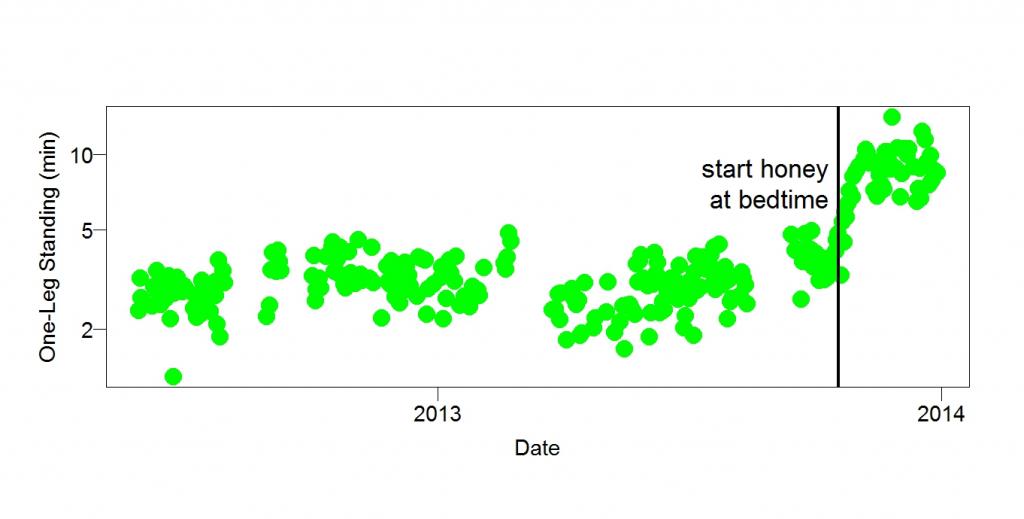Here are some especially notable results (most notable first).
Other People’s
1. Bedtime honey greatly improved sleep. Stuart King found this after many other things had failed to help him. He got the idea from Dave Asprey, who got it from The Honey Revolution (2009) by Ron Kessenden and Mike McInnes, but Stuart made by far the best case that the effect was important and determined some boundary conditions (e.g., don’t eat a lot of sugar during the day). The improvement is so big and easy (honey tastes good) that it’s quite possible this is why evolution shaped us to enjoy sweets after dinner — to improve sleep. In the future, I believe, it will be understood that sugars (at the right times in the right amounts) are a necessary nutrient — exactly the opposite of what all nutrition experts, including paleo ones and Weston Price, say. When this stunning reversal will happen I don’t know — but no one will have foretold it more than Stuart.
2. Avoidance of glutamate cured autism. “Cure” is not too strong. Katherine Reid, who has a Ph.D. in protein chemistry, realized that many many foods, including ultrapasteurized milk, contain glutamate. When all glutamate was removed from her daughter’s diet, her daughter, who had been autistic, became completely normal. The generality of this solution is unclear but to cure even one case of autism is more than anyone else has done.
3. Xylitol eliminated lichen planus. Evelyn M. found that if she swished xylitol around in her mouth several times/day, her lichen planus and overall gum health greatly improved. This effect is well-known in Scandinavia but barely known elsewhere. American dentists don’t know it, for example. I didn’t know it.
4. Caffeine reduced reaction time. Alex Chernavsky wrote his own version of my brain tracking reaction-time test and found, in a well-designed experiment, that caffeine made him faster, at least for a few hours. What’s important here is the method, not the result: Alex’s success with a test that costs nothing and takes only a few minutes/day. His success brings closer the day that many people can do these tests. When non-experts realize they can study their own health in good experiments, the world will change.
Mine
1. Bedtime honey greatly increased my strength. (More here .) This convinced me that bedtime honey was something special, more than another way to improve sleep. (I also improved my sleep by darkening my bedroom — much less important.) Bedtime honey also seemed to improve mood and motivation. I have been trying to improve my sleep my whole adult life — this, I now see, is the secret. My discovery in the1990s that lots of standing improves my sleep led to the daily one-legged standing that made the strength increase so clear.
2. A banana a few hours before bedtime (in addition to bedtime honey) improved my sleep even m ore. The Honey Prescription says it’s been known for thousands of years that bedtime honey improves sleep, but no one seems to have noticed this, in spite of the importance of sleep. As Robb Wolf has said, “If someone sleeps well, you can’t kill them. If they sleep badly, you can’t keep them alive.”
3. Tofu made me stupid. One 20 g piece of fermented tofu slowed me down for two days on a reaction-time test. Other evidence has suggested that tofu is bad for the brain, but I find this the most persuasive. It addition to what it says about tofu, it suggests the power of brain tracking to reveal important things few people know. (An earlier example involved butter.) Billions of people eat tofu often.
4. Percentile feedback helped me work. The version of percentile feedback I use now (an R program that tracks my work and compares how well I am doing today to the last 100 days) is an improvement, I like to think, over an earlier version. The biggest difference is the addition of weighting: doing a hard task for one hour counts more than doing an easy task for an hour (e.g., a factor of 1.5, so that 60 minutes counts as 90 minutes). I kept track of how much I worked for a whole year, the first time I’ve managed to do that. Here’s what happened.
I think the lesson is that with the right push, I can slowly improve.

